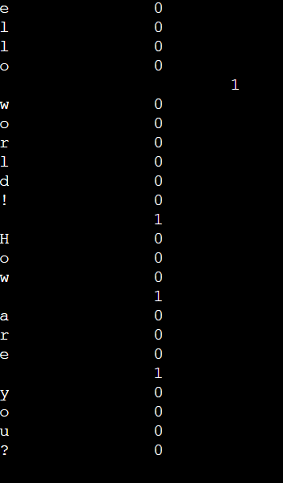iswblank() function in C/C++
In this article, you will learn about the iswblank() function in C/C++ with its example.
iswblank() function:
The C Standard Library includes the iswblank() function, which can be found in the <wctype.h> header file. Iswblank() is intended to support wide characters (wchar_t) in C, unlike isblank() in the standard <ctype.h> library. It makes it appropriate for wide character or multibyte character encoding schemes like Unicode.
The iswblank() function is typically utilized when working with wide characters in C programming, particularly in multibyte character encoding schemes like Unicode. Its function is to distinguish tab characters or blank spaces inside lengthy character strings. Here are few situations when iswblank() can useful:
- When a wide character (wc) is supplied as an input to the iswblank() function, it returns 0 in the absence of a blank character (a space or tab).
- It determines if the supplied wide character corresponds to a tab or a blank space to explicitly accommodate wide character sets.
1. Text Processing programs:
- Iswblank() might help parse, analyze, or altering text data that contains spaces or tabs when working with text input/output in programs that support multilingual content or a variety of character sets.
2. Language Localization and Internationalisation:
- Iswblank() aids in text formatting, sorting, or validating input that contains whitespace in software that needs language localization (supporting multiple languages) or internationalization (handling diverse cultural conventions), where wide character encodings like Unicode are common.
3. User Input Validation:
- iswblank() can be used to validate user input in situations where it must follow certain formatting guidelines, such as making sure spaces or tabs are used appropriately in specific fields (such addresses, names, etc.).
4. Word processing or text editor tools:
- When managing white spaces or tabs within wide character documents, text editors, word processors, or apps that deal with text formatting and manipulation frequently may use iswblank() to ensure proper rendering or processing.
5. File management in Multibyte Environments:
- The iswblank() function can help with text parsing, extraction, or modification operations that need the identification and management of whitespace characters when working with files that contain multibyte character encodings (Unicode, UTF-8, etc.).
6. Character Classification and Filtering:
- iswblank() can assist in differentiating between spaces and tabs in specific algorithms or jobs that call for the classification or filtering of wide characters based on whitespace criteria, such as avoiding leading or trailing whitespace in text.
7. Custom Text Processing Operations:
- When it comes to character classification based on whitespace characters, developers may choose to design unique text processing operations or functions. These custom procedures can include iswblank() to handle wide characters as needed.
Program:
Let us take a program to illustrate the isblank function in C.
Output:

Explanation:
1. Header Inclusion:
- The code includes header files that are required for standard I/O operations, wide-character functions, wide-character handling, and establishing the program's locale, such as <stdio.h>, <wctype.h>, <wchar.h>, and <locale.h>.
2. main() Function:
- This function serves as the program's entry point.
- For appropriate handling of wide characters, setlocale(LC_ALL,"") is used to set the program's locale to the system default.
3. Initializing a Wide Character String:
- An example of a wide character stringA sentence with a tab (\t) in between words serves as the declaration and initialization of the text.
4. Creating the Sample Text Output:
- The code outputs the contents of the sampleText wide character string to the console using a method similar to wprintf().
5. Character Displaying and iswblank() Outcome:
- The code creates headers for a table that shows characters along with the results of iswblank().
- Every broad character in sampleText is iterated through.
- It prints the character itself together with the outcome of the iswblank() function, indicating whether the character is a tab or a blank space.
6. Return Statement :
- The program is terminated, and the main() function is completed successfully when the return 0; statement is seen.
Conclusion:
In conclusion, developers may now precisely identify tab characters or blank spaces in text encoded in a wide character format due to the iswblank() method, which is specifically designed for wide character sets. Programmers dealing with wide character encoding systems, like Unicode, can manage and manipulate text-based data containing spaces and tabs with precision by using iswblank(), which guarantees accurate text processing and character classification.
Comprehending the features of iswblank() makes handling wide characters in C much more efficient. It allows developers to work with a variety of character encoding systems and design strong algorithms for wide character text processing applications.
|

 For Videos Join Our Youtube Channel: Join Now
For Videos Join Our Youtube Channel: Join Now










